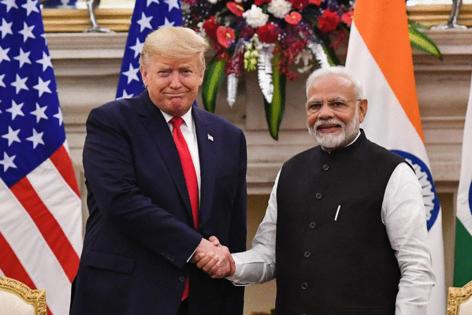Mihir Sharma: India has good reason to help shore up Trump's wall
Published in Op Eds
India is proud of its diaspora. People of Indian extraction tend to earn well over the average wage in most countries, and often fit seamlessly and unobtrusively into local power structures.
Prime Minister Narendra Modi has made a point of cultivating Indians abroad and sometimes gifts foreign leaders a bit of his star power for their own campaigns. He attended a joint rally in Texas during President Donald Trump’s first term, for example.
So, the subject of illegal Indian migrants to the U.S. would appear to require delicate handling. According to Bloomberg News, the incoming administration has identified at least 18,000 Indian citizens living in the U.S. illegally and wants them sent back. That number could grow: The Pew Research Center estimated in 2022 that Indian citizens make up the third-largest community of undocumented immigrants in the U.S.; there might be as many as 725,000 of them.
The composition of the most recent arrivals is particularly sensitive. While hard data is lacking, reporting suggests that many if not most are young men from the western states of Punjab and Gujarat. Both regions are relatively well-off; Gujarat in particular has long been touted as a model of development — especially by Modi, who rode to national power by selling his record as that state’s growth-minded chief minister.
If it turns out that young people from such prosperous areas are being driven to follow the “donkey route” to the U.S., a few questions might begin to be asked about the famous “Gujarat model” of growth. Some opposition politicians have already started demanding answers.
Yet U.S. leaders might be surprised at how unbothered most Indians or even Indian Americans are likely to be about the proposed repatriations. In countries such as India, illegal migration is not exactly popular; the numbers willing to take such risks are small when compared to the country’s vast population. For decades there have even been legal checks on Indians below a certain income or without a college degree leaving the country for the Persian Gulf, supposedly to ensure that they aren’t exploited by traffickers.
Meanwhile, most Indians in the U.S. legally would want to draw a sharp distinction between them and their compatriots sneaking into the country from Canada or Mexico. At that Texas rally, Modi even backed Trump on the need for “border security.”
Indeed, Indian authorities have good reason to cooperate with Western politicians worried about illegal immigration. India has already signed several bilateral agreements to repatriate citizens, including with Germany and the U.K.
In part, that’s because India wants to be a reliable source of legal migration — a key pillar of its plans to develop its workforce and economy. Remittances from Indians working elsewhere bring in crucial foreign exchange. India derives more money from its citizens abroad than any other nation; in 2022, they sent back $111 billion, almost double the amount remitted to Mexico.
Indians studying overseas also take pressure off the country’s overstretched universities. And circular migration provides a useful pathway for learning and deploying skills in what is still a very young country.
Accountability for those abusing the system is a crucial component of the strategy. Most of India’s repatriation agreements include new pathways for legal and temporary migration alongside mechanisms for returning illegal migrants. If that will be hard for the U.S. to provide right now, Modi’s government might be open to discussing deportations anyway to keep Trump happy.
The key is not to make too much of a fuss about it. Being the source of illegal migration isn’t something anyone wants to advertise, least of all officials in New Delhi whose job is to tell the Indian public that everything is going swimmingly.
Trump’s agenda might be America-centric. But many of its pillars — including dealing with illegal immigration — will require cooperation from other countries. If he wants to work with governments such as India’s, he can. The question is how willing he will be to notch quiet victories rather than crowing about them.
_____
This column does not necessarily reflect the opinion of the editorial board or Bloomberg LP and its owners.
Mihir Sharma is a Bloomberg Opinion columnist. A senior fellow at the Observer Research Foundation in New Delhi, he is author of “Restart: The Last Chance for the Indian Economy.”
_____
©2025 Bloomberg L.P. Visit bloomberg.com/opinion. Distributed by Tribune Content Agency, LLC.




























































Comments